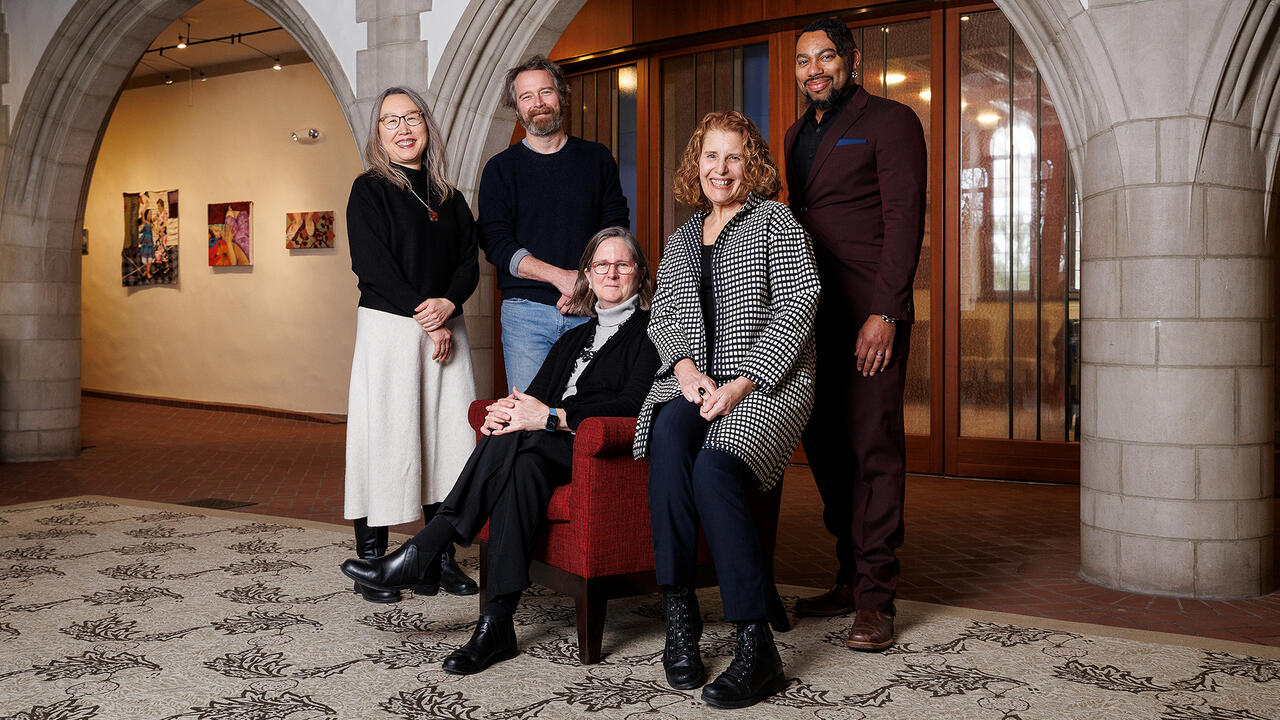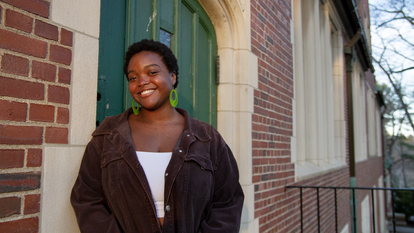
Wellesley humanities faculty receive $1.5 million Mellon Foundation grant
What’s a Wellesley professor to do with a rejected Mellon Foundation grant proposal? How about meet with fellow rejectees on campus, combine the best parts of each colleague’s proposal into one, try again—and secure one of the biggest Mellon Foundation grants ever received by Wellesley College.
That’s what happened for Yoon Sun Lee, Anne Pierce Rogers Professor in American Literature and professor of English, Eve Zimmerman, professor of Japanese, Cord Whitaker, associate professor of English, and Martha McNamara, director of the New England Arts and Architecture program and senior lecturer in art history. After having unsuccessfully applied for individual Mellon Foundation grants the previous year, they compared their proposals with the aim to co-write a new one. Lee took on the role of lead editor, and Lorraine C. Wang Professor of English Dan Chiasson joined the group. The five faculty members submitted a joint proposal to the Mellon Foundation: “Transforming Stories, Spaces, Lives: Rethinking Inclusion and Exclusion through the Humanities.” It was one of just a few projects from across the country awarded funding from the 2023 Mellon Foundation “Humanities for All Times” competition.
The $1.5 million grant will fund a 3 ½-year project that will unite the College’s many and varied humanities departments through the themes of democracy, environmental justice, and identity. At a time when many higher education institutions have merged some of their humanities departments or cut others entirely, the project will give the humanities at Wellesley a major boost.
“This grant is exciting because it addresses some of the greatest institutional challenges we have right now,” says Andy Shennan, provost and Lia Gelin Poorvu ’56 Dean of the College.
Jennifer Banks, director of the Office of Corporate and Foundation Relations, works closely with Wellesley faculty members to apply for grants like the ones offered by Mellon. She saw similar threads in the professors’ rejected applications and suggested they work together to tackle something more ambitious encompassing all of their ideas. Think: five solo artists forming a musical supergroup.
“This is the best example of collaboration between an administrator and faculty,” says Zimmerman, who adds that she and the entire faculty team are grateful for Banks’s support and encouragement. Banks is quick to put the emphasis on the work of the faculty: “If I did anything, it was that I refused to give up that Wellesley had an idea that was a great fit for the Mellon Foundation.”
What we do as humans is we make meaning. And what humanities does is help us make meaning in order to understand ourselves and the rapidly changing world around us.
Martha McNamara, director of the New England Arts and Architecture program and senior lecturer in art history
What’s exciting about this project, Whitaker says, is that “it’s coming from the perspective not of ‘we must revitalize the humanities’ but that we need to be more conscious of the ways humanities disciplines allow us to engage with, enjoy, trouble, shape, and transform our own stories.”
Lee says they want to involve as many faculty across the humanities as possible. So far 50 of the humanities faculty—45%—have signed on to be part of a larger team to help implement the following three goals outlined in the grant proposal:
Goal 1: Transform the humanities at Wellesley by revising curriculum and courses. For example, Chiasson is excited to develop new courses that explore close reading as a way to grapple with AI-generated content. “We feel we can train students to detect and distinguish human presence in written language, which will be essential going forward,” he says. “You’re looking for the sound of an individual mind and imagination while reading. We can teach students not only to distinguish humans from robots, but also humans from one another.”
Goal 2: Create a just and equitable Wellesley by funding student research projects in the humanities. “In the sciences, there’s already a model for bringing students into the research process, training them how to do research, and including them in these big projects,” says Lee, but there have been few similar opportunities for students in the humanities, especially with funding. McNamara is excited that humanities students at Wellesley will have the chance to get paid to dig more deeply into their work, rather than having to decide between doing research or making money: “We wanted to create a structure where students wouldn’t have to scoop ice cream in the Vil [to support their research],” she says.
These student-faculty research collaborations will be housed in a new humanities hub in Clapp Library, which is currently under renovation. The hub will provide a home base for students studying topics ranging from Russian literature to theater to the Renaissance.
Goal 3: Change the world beyond Wellesley by showing students ways the humanities apply outside of 106 Central Street. Humanities faculty will connect students with nonprofits, activist organizations, and other groups outside the College that are applying many of the concepts discussed in the humanities courses. “They’re going to be bringing the humanities out of the classroom and into the world,” says Zimmerman. “They’re going to be working together in real time, coming up with concrete results that are meaningful to them personally and intellectually.”
“To be at Wellesley and to use that time well is to be able to understand who you have been in the world, who you are in the world, and who you wish to be in the world,” says Whitaker. “The best way to do that is to try to understand your story even as you are creating it.”
Lee hopes that over the course of the grant, 200-plus students will engage in paid research or public humanities projects. The first phase, which will involve revising and creating humanities courses, offering workshops and training for faculty, and beginning outreach to students, will start this semester, and the grant will fund the project through the 2026–27 academic year.
The faculty involved in the grant feel this project is not just about their academic interests, but about humanity in general.
“What we do as humans is we make meaning,” says McNamara. “And what humanities does is help us make meaning in order to understand ourselves and the rapidly changing world around us.”



